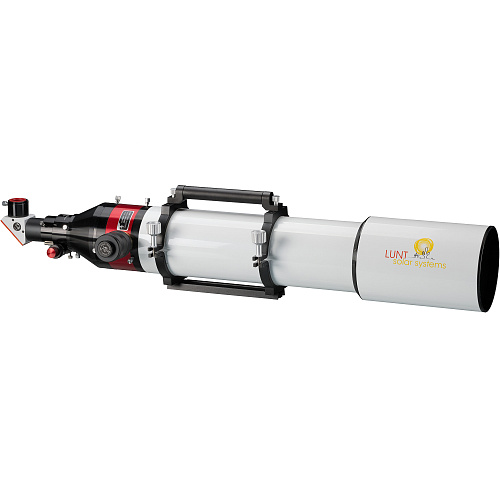LUNT LS130THa/B1800 H-alpha Solar Telescope
Refractor. Objective lens diameter: 130mm. Focal length: 910mm
| Product ID | 75957 |
| Brand | LUNT Solar Systems |
| Warranty | 2 |
| EAN | 4007922062624 |
| Package size (LxWxH) | 103x54x47 |
| Shipping Weight | 30 |
The LS130MT is a triplet ED apochromatic refractor with modular design! The telescope can also be used for night sky observations, and with the optional available accessories also for observing the sun in the Ca-K wavelength and in white light!
The LS130MT/B1800 is a complete telescope for observing the sun in H-alpha light, with 130mm free aperture (no central obstruction) and 910mm focal length. The higher resolution compared to telescopes with smaller aperture allows the observer to dive into the fine details and surface phenomena of our ever-changing Sun. The higher resolution allows higher magnifications, bringing the fine details of the Sun to life in the eyepiece or on the screen.
An internal Etalon filter with the innovative air pressure tuning system Pressure Tuner achieves a bandwidth of <0.7 Angstroms. The tuning is done by slightly changing the air pressure in a pressure chamber inside the telescope. This changes the refractive index of the air, making it easy to adjust to the H-alpha line. The pressure tuner guarantees an homogeneous image without central obstruction and a permanently protected etalon without wear. A set of collimating lenses installed in the telescope ensures best performance.
Fine adjustment is achieved by a 2" Starlight-Instruments Feather-Touch focuser with 1.5" travel and 10:1 reduction.
Blocking-filter is the B1800. The B1800 is good for visual solar observing and also for solar imaging by cameras with small to large CCD chip. We recommend a LS130MT with B3400 blocking-filter by using cameras with very large sized CCD chips. The star diagonal in which the blocking filter is installed, is equipped as standard for 1.25" eyepieces and with a T2 camera connection.
Also the LS130MT telescope is upgradeable with the additional available DSII double-stack system. The optional DSII system is a internal double stack module with Pressure Tuner, that provides a bandwidth <0.5 Angstrom. More details on the solar surface will become visible by reducing the bandwidth.
Modular design:
- The H-Alpha Etalon system can be easily removed from the telescope. The 3-lens ED apochromat can be used as a normal telescope for observation and imaging of the night sky.
- Also available is a Ca-K module specially developed for the LS130MT. This also allows to observe the sun in the blue calcium wavelength.
- A Herschel-wedge can also be used for observing the sun in white light.
- This makes the LS130MT a completely universal usable telescope!
Features:
- Triplet ED apochromatic refractor, FPL-51
- Aperture: 130mm (no central obstruction)
- Focal length: 910mm
- Bandwidth: internal Etalon with <0.7 Angstrom
- Tuning: air-pressure tuning system
- Blocking-filter: B1800 with 1.25" and T2 connection
- Focuser: Starlight Instruments Feather Touch focuser with 10:1 reduction
- Two tube rings with carrying handle
- Dove tail bar with GP level for astronomical mounts
The kit includes:
- LS130MT multipurpose telescope
- Pressure Tuner system
- B1800 blocking-filter in star diagonal
- 2" Feather Touch focuser
- Tube extension for using without H-alpha Etalon
- Tube rings with dove tail bar
- Transport case
- Instruction manual
| Product ID | 75957 |
| Brand | LUNT Solar Systems |
| Warranty | 2 |
| EAN | 4007922062624 |
| Package size (LxWxH) | 103x54x47 |
| Shipping Weight | 30 |
| Optical design | refractor |
| Optical scheme | apochromat |
| Objective lens diameter (aperture), mm | 130 |
| Focal length, mm | 910 |
| Aperture ratio | f/7 |
| Eyepiece barrel diameter, in | 1.25 |
| Bandwidth, Angstrom | <0.7 |
| Observed object | planets of the Solar System and deep-sky objects |
| Pouch/case/bag in set | case |
and downloads
Convenient diagrams that describe how to install additional accessories on refractors and catadioptric telescopes
Find out how to assemble a telescope on an example of the Levenhuk Skyline 90x900 EQ telescope
This short guide will help you avoid typical mistakes and learn more about telescope and mounting types
The basics of astronomical observations for beginners
In this article we have gathered answers to some of the most frequently asked questions about telescopes
How telescopes work?
You can actually perform observations from your balcony!
All about telescope sizes, types, magnification, and mounts
Learn how to set up and use the telescope properly
Astronomy in light-polluted skies. Find out what you can observe in the city
Read an interesting comprehensive article on telescopes for little astronomers
Celestial objects you can observe with telescopes of different apertures
Colored and vivid images of galaxies, planets and star clusters entrance everyone who is fascinated by boundless space
Find an interesting review on the history of the changes to a refracting telescope
To make the process of choosing a telescope easier, we will tell you about the characteristics of the most popular types of telescopes today
Learn everything you need to know about refractor telescopes to make the right choice











